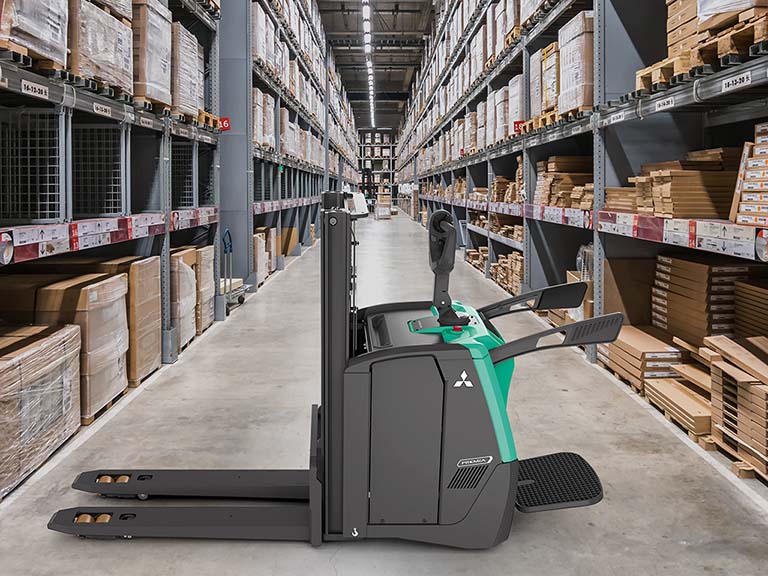Although some manufacturers have committed to a single solution, there’s a case to be made for every energy source, which is why Mitsubishi Forklift Trucks offers customers the widest and most advanced version of each across its huge product range.
For the purposes of this article, though, we’ll leave LP Gas and diesel to one side and focus on the three main types of battery for forklift and warehouse trucks.
Standard lead acid
If you are already using flooded lead acid batteries and already have the necessary infrastructure in place, then there are plenty of reasons for sticking with what you’ve got. Traditional lead acid is cheap, reliable and surprisingly green, with 98% of every battery recovered and recycled.
You’ll be aware of the slow re-charge times but charging efficiency can be greatly improved by switching to intelligent chargers... which will also reduce energy bills and extend battery life.
The downside to traditional lead acid is the need for regular maintenance/topping-up. If that doesn’t happen consistently and carefully, over time, day-to-day performance will decline, and the working life of the batteries will diminish.
If good battery care can’t be guaranteed, then there are two alternative courses of action. The first –would involve a switch to an alternative such as lithium-ion (which is significantly more expensive but is virtually maintenance-free). The second (and cheaper) option is to outsource battery top-up and maintenance to an outside, specialist supplier.
Lithium-ion (Li-ion)
Although the initial purchase price is much higher than for standard lead acid, a lithium-ion battery will typically last around 4 to 5 times longer (typically delivering 5,000 cycles compared with 1,500 for standard lead acid). Meaning whole-life costs become much more competitive.
Perhaps the single biggest attraction, though, is convenience. Lithium-ion batteries can be rapidly ‘opportunity’ charged during lunch or tea breaks, so trucks are almost always available. Even from 90% DOD (depth of discharge), lithium-ion is good to go after a single, one-hour charge.
There’s no topping up, no acid, no gassing and no maintenance. There are no battery changes (so no changing equipment), and, because there’s no charging area, greater space utilisation can be achieved.
One major potential drawback, however, is the large AC power draw required. This makes it unsuitable in some locations where the grid is inadequate. In some cases, the installation may require a load power management system. What’s more, because of the high-power draw, break-times may need to be staggered to facilitate charging.
To be truly cost-effective, its crucial to specify precisely the right Li-ion battery… which is why our specialists take such care in analysing each customers individual application.
Enhanced lead acid
The final contender is a relative newcomer but has been tipped by some experts to become the pre-eminent energy source in materials handling applications: enhanced lead acid.
Put simply, the technology delivers the benefits of traditional lead acid along with the convenience of rapid, opportunity charging normally associated with lithium-ion. It also offers some very attractive performance benefits, especially in heavy-duty applications and in low-temperature environments.
Ideal for demanding, multi-shift operations, the latest enhanced lead acid batteries harness advanced technology to deliver 25 percent longer run times in ambient temperatures (often resulting in an additional shift), higher discharge rates, higher energy density, and lower internal resistance for fast, opportunity charging with no degradation.
In short you get far higher output from the same footprint as a standard lead acid battery whilst eliminating risk of power collapse on ramps, at heights and in hostile environments such as cold stores or prolonged periods outdoors.
Cheaper than lithium-ion but with a similar cycle-life, enhanced lead acid batteries reduce capital costs when compared to traditional lead acid as fewer batteries, chargers and associated equipment are required. This also provides an opportunity to free up floor space for greater space utilisation.
To wrap things up, it's best to choose a materials handling supplier who can offer all three options and provide impartial advice. The perfect battery for your requirements depends on various factors customised to your specific circumstances and your organization's values.
For more information visit www.mitsubishi-forklift.co.uk or call the Green Line on 0845 3713048.

-1.jpg?width=600&height=450&name=li-ion-battery%20(002)-1.jpg)
